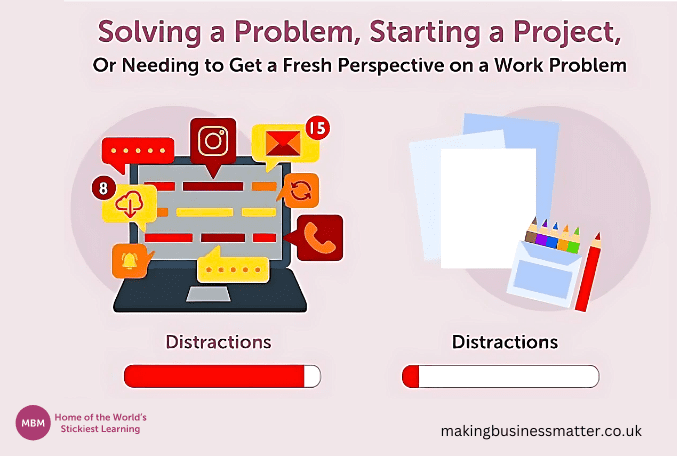Now, Where Was I? Oh, Yes Distractions.
I believe that the most successful people have this in common. They can manage their distractions, and they can focus. So, how do you manage them? And how do you focus?
Let’s start with an example and then we’ll get back to what are distractions, managing them and remaining focused.
The 4-Minute Badger!
Imagine you are driving, which is a fairly automated task needing a degree of concentration, but not too much to be exhausting as you’ve driven a lot before. A badger runs out in front of you, you are jolted to full concentration, and you swerve. Missed it. Phew! Back to the automated driving, 4-minutes later another badger runs out in front of you, and you swerve again. Two in a few minutes, this cannot be right. 4-minutes later, another – what’s going on?!
You receive about 120 emails per day. That’s one every 4 minutes. An email notification pops up – your mind says – ‘I’ll just take a look and see if that is urgent’. It’s not about urgency, it’s about being curious and anything that takes you away from the current task. Turn off your email notifications and stop the badgers running out in front of you.
This is the very definition of distractions.
Turn Off Your Email Notifications
“Ah, but Darren, you don’t know my customers and my boss.”
“You’re right I don’t. If you are telling me that you have to live in your inbox, then cancel all holidays and any meetings because when you are doing those two things you are not in your inbox. Yet, you somehow manage”.

I get that it’s hard, but if it were easy you’d have already done it. It is hard. Change is hard. Changing habits that you have had for +10 years is almost impossible. It depends on how bad the problem is. If you can continue to be less productive because the distractions are manageable, then don’t read on anymore and get the knack to work. If you do want to change, then keep reading.
Manage the Email Notifications Better
Here are 3 things you can do to make a small yet significant impact by turning off your email notifications and managing them better:
- Receive email notifications from VIP’s only.
- Change how Outlook tells you that you have an email. These are the 4 options you can change:
- Playing a sound.
- Changing the mouse pointer.
- Showing an email icon in the taskbar.
- Displaying a banner alert in the bottom right of the screen (top right for Mac users).
- If you must keep your email notifications switched on, then here’s an alternative. Read this article about the hare and the tortoise which offers a method to manage your emails.
Sticky Learning ® is 7 times more effective than 1-day training courses. Plus, you will get a Chain of Evidence proving your Return on Investment. Discover soft skills training that changes behaviours long term.

Managing the Procrastinating You – ‘The Procrastination Radar’

We all have a procrastinating self. We don’t like that person. They do the little things when the big stuff should be done, and they do the big stuff when they are exhausted at the end of the day.
When that person has a big task to do, their procrastination radar pops up from the top of their head looking for anything else to do, so that they don’t have to do the task at hand.
‘Aha, Bob, we haven’t talked about health and safety in years. Let’s do it now’. You know ‘that person’ inside our heads – the procrastinator, the operator of the procrastination radar – They are an expert in operating that radar. Dam them!
How Do You Manage Distractions? Beyond the Email Notifications
Tips 1-5
- 1. The first step towards changing any bad behaviour is knowing it happens. You know you are an excellent procrastination radar operator. We need to manage this better.
- 2. Do as Brian Tracy, the US time management expert suggests, and ‘Eat That Frog’. Do that big and horrible thing first because, as Mark Twain said, “Eat a live frog first thing in the morning and nothing worse will happen to you the rest of the day.”
- 3. Go old school. If you can. The problem with working at a computer is that a thousand things can easily distract your attention. Your phone too. Grab a pad, preferably A3, some pens, and go brainstorm, mind-map, list, or anything that helps you to work on the problem/task, without any distractions.
Click the image below for a higher resolution.

- 4. Set a Pomodoro timer.
- 5. Alan Lakein, is considered to be the grandfather of time management. His book, ‘How to Get Control of Your Time and Your Life’ was published in 1973. One of his famous metaphors for getting started was to ‘poke a hole in the cheese’. He just wanted you to start with a simple and practical task, and poke one hole in the cheese because he knew that once you did, it was like a snowball rolling down the hill – the rest would take care of itself.
Tips 6-12
- 6. Use Microsoft Tech. MS provides many insights on your working day, from who you collaborate with, how late you were to meetings, and how many emails you send. This article on ‘My Analytics‘ will help you discover your habits.
- 7. Write a daily to-do list because if you don’t have a plan for what you are going to do, I guarantee someone will create one for you, in the form of emails of, ‘Can you just…’.

- 8. If a task comes into your world and you can it under 3-minutes, then do it. This is because to put that task into your time management system, which might just be a bunch of post-its, it is not worth the effort. Just get it done. The watch out is to not kid yourself that it will be 3-minutes when you know that it will take 20-minutes to do.
- 9. Learn task switching and how it kills your productivity.
- 10. Buy the 7-Week Time Management Challenge from Amazon.
- 11. My son, Jack, recently deleted all his social media channels because he felt as though it was taking over his life. Brave more. Brilliant move. Could you do the same?
- 12. ‘Mark, could you just give me some help with this excel file, please?’. Being helpful is a good trait. The downside is that if you ‘train’ people that you are always available, always willing to help, and that nothing is too much trouble, they’ll always ask. Like Pavlov’s dogs. We need to be mindful of the phrase, ‘If you give a man a fish, you feed him for a day. If you teach a man to fish, you feed him for a lifetime.’. How can we help them to help themselves? Coach them, maybe?
Final Thoughts
Your ability to manage distractions and focus is the measure by which you will achieve success. The more you get distracted, the less focused you are. The less focused you are on doing what makes the difference, the less success you’ll achieve.
Manage your distractions.
Focus.
Succeed.




